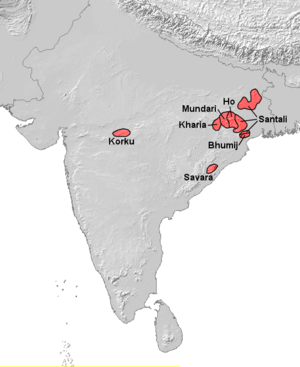Munda peoples
The Munda peoples of eastern and (in the case of the Korku) central India are any of several tribal groups of people who natively speak Munda languages, formerly also known as Kolarian.
 Distribution of Munda language speakers in India | |
| Regions with significant populations | |
|---|---|
| India, Bangladesh | |
| Languages | |
| Munda languages |
History
According to linguist Paul Sidwell, Munda languages arrived on the coast of Odisha from Southeast Asia about 4000-3500 years ago.[1] The Munda people spread from Southeast Asia and mixed extensively with local Indian populations.[2]
Ethnic groups
- Munda people
- Ho people
- Santhal people
- Birhor people
- Bhumij people
- Korwa people
- Kodaku people
- Korku people
- Kharia people
- Juang people
- Sabar people
- Sora people
- Gorum (Parenga) people
- Gadaba people (Only some Gadabas speak the Bonda-related Gutob language. Some others speak a Dravidian language.)
- Bonda people
- Didayi (Dire, Gta’) people
Possible kins of the Munda peoples
Some ethnic groups do not natively speak any of the Munda tongues, but nevertheless have been linked by some to the Munda lede grounded upon anthropological or genetic token:
gollark: "Great capacity" how?
gollark: I don't see why you would want to.
gollark: Lakefield is *specifically* for low-power devices, it's not going to *perform better* than monolithic things.
gollark: I think the main advantage is just that it's small and you can have fast I/O between each die. It doesn't magically become faster.
gollark: I've heard of Lakefield. But in most cases I don't think space is such a priority that you need this.
References
- Sidwell, Paul. 2018. Austroasiatic Studies: state of the art in 2018. Presentation at the Graduate Institute of Linguistics, National Tsing Hua University, Taiwan, 22 May 2018.
- Schliesinger, Joachim (2016). Origin of the Tai People 3: Genetic and Archaeological Approaches. Booksmango. p. 71. ISBN 9781633239623. Retrieved 3 October 2019.
External links
- http://projekt.ht.lu.se/rwaai RWAAI (Repository and Workspace for Austroasiatic Intangible Heritage)
- http://hdl.handle.net/10050/00-0000-0000-0003-66EE-3@view Munda languages in RWAAI Digital Archive
This article is issued from Wikipedia. The text is licensed under Creative Commons - Attribution - Sharealike. Additional terms may apply for the media files.